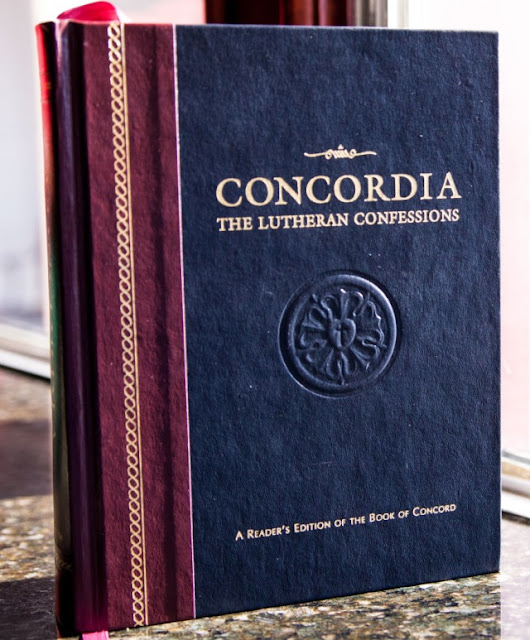Concordia
Quodlibet: Ask Pastor Anything
On Reading the Book of Concord
Dear X—,
Thank you for your excellent questions on the Book of Concord. I'll try to
address them sequentially.
(1) “Is the Book of Concord discussed much in teachings or conferences?” Yes
and no. I don't know that people often bring their copies to cite specific
sections, but all Lutheran pastors take an in-depth Confessions class (it’s the
core of our theological education) and it forms our understanding of the Bible,
the Sacraments, the Church, the role of the clergy, &c. Our theology is
Confessional.
(2) “Have you ever had a short study on its contents?” Yes, we have. A year or
so ago we were reading sections of the Augsburg Confession for Pub Theology,
article by article. The Small Catechism provides the structure for our Lenten
midweek services and also one of the three years of our Confirmation program
(this year, in fact).
(3) “Before one becomes a member of the congregation, you have a discussion of
Martin Luther's Small and Large Catechism?” Ideally, yes. The Small Catechism
is designed to be an at-home guide for religious instruction and biblical
interpretation. It is penned for the husband and wife as “bishop and bishoppess”
of the household. The Large Catechism is certainly a good thing for anyone to
read, but is oriented more toward pastoral duties and understandings.
(4) “What are your thoughts on one being a confessional or non-confessional
Lutheran?” In my experience, these terms vary based on context, i.e. in
disagreements between Lutherans one often accuses the other of being
non-confessional. Certainly I would find it hard to imagine being Lutheran in
any meaningful sense if one did not confess (at the very least) the Catechism
and the Augsburg Confession as good and true interpretations of the Scriptures.
These are the documents that literally defined Evangelical Lutheranism. That
said, I think that most everyone would find at least some part of the Book of
Concord with which we might quibble or seek clarification.
(5) “This book so far has given me a better perspective of the Reformation
movement.” I’m glad to hear it. So often the Reformation is presented as
something new or revolutionary, whereas the original Reformers were adamant
(in, for example, the Augsburg Confession) that our churches teach nothing new,
but faithfully adhere to the apostolic faith as it was passed on to us.
May your reading continue to be fruitful for the faith that we share.
See also: The
3½ Lutheran Answers to Any Question and the Marks of the Church.

Comments
Post a Comment